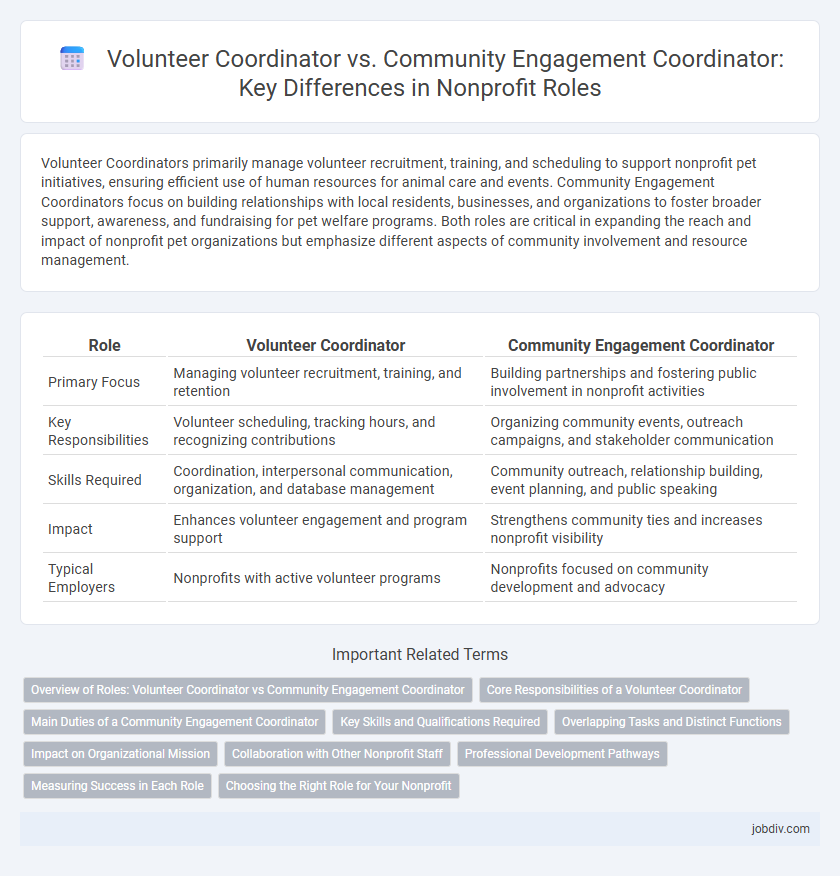Volunteer Coordinators primarily manage volunteer recruitment, training, and scheduling to support nonprofit pet initiatives, ensuring efficient use of human resources for animal care and events. Community Engagement Coordinators focus on building relationships with local residents, businesses, and organizations to foster broader support, awareness, and fundraising for pet welfare programs. Both roles are critical in expanding the reach and impact of nonprofit pet organizations but emphasize different aspects of community involvement and resource management.
Table of Comparison
| Role | Volunteer Coordinator | Community Engagement Coordinator |
|---|---|---|
| Primary Focus | Managing volunteer recruitment, training, and retention | Building partnerships and fostering public involvement in nonprofit activities |
| Key Responsibilities | Volunteer scheduling, tracking hours, and recognizing contributions | Organizing community events, outreach campaigns, and stakeholder communication |
| Skills Required | Coordination, interpersonal communication, organization, and database management | Community outreach, relationship building, event planning, and public speaking |
| Impact | Enhances volunteer engagement and program support | Strengthens community ties and increases nonprofit visibility |
| Typical Employers | Nonprofits with active volunteer programs | Nonprofits focused on community development and advocacy |
Overview of Roles: Volunteer Coordinator vs Community Engagement Coordinator
A Volunteer Coordinator manages the recruitment, training, and scheduling of volunteers to support nonprofit programs, ensuring effective volunteer utilization and retention. A Community Engagement Coordinator focuses on building and maintaining relationships with community members, partners, and stakeholders to increase organizational visibility and foster collaborative initiatives. Both roles drive nonprofit mission success, with the Volunteer Coordinator prioritizing internal volunteer management and the Community Engagement Coordinator emphasizing external community connection.
Core Responsibilities of a Volunteer Coordinator
A Volunteer Coordinator manages recruitment, training, and scheduling of volunteers to ensure effective support for nonprofit programs, facilitating communication between volunteers and staff. This role monitors volunteer performance, maintains records, and organizes recognition initiatives to boost volunteer morale and retention. The focus lies on optimizing volunteer contributions to align with organizational goals and maximize community impact.
Main Duties of a Community Engagement Coordinator
A Community Engagement Coordinator primarily designs and implements programs that foster meaningful relationships between the nonprofit and local communities, ensuring active participation and support for organizational goals. This role involves strategizing outreach efforts, organizing community events, and collaborating with diverse stakeholders to enhance public awareness and resource mobilization. Unlike a Volunteer Coordinator, who focuses on recruiting and managing volunteers, the Community Engagement Coordinator emphasizes broader community partnerships and sustainable engagement initiatives.
Key Skills and Qualifications Required
Volunteer Coordinators require strong organizational skills, experience in volunteer management, and the ability to recruit, train, and retain volunteers effectively. Community Engagement Coordinators need excellent communication skills, expertise in public relations, and proficiency in building partnerships with diverse community groups. Both roles demand leadership, adaptability, and a deep commitment to the nonprofit's mission.
Overlapping Tasks and Distinct Functions
Volunteer Coordinators and Community Engagement Coordinators both facilitate relationships between organizations and people, focusing on volunteer recruitment, training, and retention while fostering community involvement. Volunteer Coordinators primarily manage volunteer programs, scheduling, and direct volunteer support to ensure effective service delivery. Community Engagement Coordinators emphasize building broader partnerships, organizing events, and enhancing public awareness to strengthen community ties and support organizational missions.
Impact on Organizational Mission
Volunteer Coordinators play a crucial role in recruiting, training, and managing volunteers, directly enhancing program delivery and operational efficiency to advance the nonprofit's mission. Community Engagement Coordinators focus on building relationships with diverse stakeholders and fostering community partnerships, which strengthens public support and expands the organization's reach. Both roles are vital for mission impact, with Volunteer Coordinators driving internal resource mobilization and Community Engagement Coordinators amplifying external influence and collaboration.
Collaboration with Other Nonprofit Staff
Volunteer Coordinators specialize in managing and supporting volunteers, ensuring seamless communication and coordination with fundraising and program teams to maximize volunteer impact. Community Engagement Coordinators focus on building partnerships both within the organization and with external stakeholders, collaborating closely with outreach, marketing, and program staff to foster broader community involvement. Effective collaboration between these roles enhances nonprofit capacity by aligning volunteer efforts with overall community engagement strategies.
Professional Development Pathways
Volunteer Coordinators often advance through roles in program management or nonprofit administration by gaining skills in volunteer recruitment, scheduling, and retention strategies. Community Engagement Coordinators typically progress by developing expertise in stakeholder collaboration, public relations, and strategic outreach initiatives, enhancing organizational influence and partnership-building capacity. Targeted professional development programs in nonprofit leadership, communications, and project management accelerate growth opportunities for both positions within the nonprofit sector.
Measuring Success in Each Role
Volunteer Coordinators measure success by tracking volunteer recruitment numbers, retention rates, and the impact of volunteer activities on organizational goals. Community Engagement Coordinators focus on metrics such as community participation levels, partnership development, and the effectiveness of outreach programs in fostering local support. Both roles prioritize data-driven outcomes to enhance nonprofit mission fulfillment and stakeholder satisfaction.
Choosing the Right Role for Your Nonprofit
Volunteer Coordinators specialize in recruiting, training, and managing volunteers to support nonprofit programs effectively, ensuring optimal volunteer retention and productivity. Community Engagement Coordinators focus on building relationships with local stakeholders, organizing outreach activities, and fostering partnerships that enhance the nonprofit's visibility and community impact. Selecting the right role depends on your nonprofit's primary needs: efficient volunteer management or strategic community relationship development.
Volunteer Coordinator vs Community Engagement Coordinator Infographic

 jobdiv.com
jobdiv.com